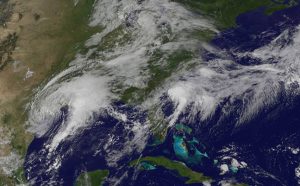
This visible image of Tropical Storm Harvey was taken on Aug. 28, 2017 at 10:30 a.m. EDT as it began moving back into the Gulf of Mexico. PHOTO: NASA/NOAA GOES Project
Our thoughts and prayers are with everyone in the Greater Houston area this week, as well as in southern Louisiana, Mississippi and other areas in which Tropical Storm Harvey is threatening to dump dangerous amounts of rain.
As I write this, there’s no end in sight to the storm and its resulting floods. But the waters will recede eventually. And it is in that aftermath that local pest management professionals (PMPs) will not only have to pick up the pieces of their personal and business lives, but also deal with the huge influx of pests. Rodents will thrive in the debris left behind; mosquitoes will make use of the stagnant water. The resulting chaos and loss of routines mean it will be that much harder to charge and collect for pest work — and insurance payouts could take months to sort through.
If there was any silver lining to Hurricane Katrina in New Orleans in 2005, it’s that researchers studied the aftermath extensively to prepare for future threats. A recent study by the National Science Foundation, for example, examined exactly where rats moved in after a natural disaster. Among the findings detailed in the NSF release, “Where do rats move in after disasters? This team finds out,” is one that defies conventional wisdom: Sure, rats move into abandoned areas, but “the conditions of those spaces mattered: A block of abandoned but maintained houses attracted smaller rodent populations than equivalent areas with overgrown lawns and other upkeep issues.”
New Orleans took the unusual step of using fish to combat the mosquito population in Katrina’s wake, per National Geographic’s 2006 article, “New Orleans enlists fish to fight mosquitoes in swimming pools.” In addition, New Orleans-area PMPs found they had a prime opportunity to bring down another pest menace, as reported by the Associated Press in 2006: “Katrina helps New Orleans fight fire ants.”
The fact that the NSF study took place in 2015, 10 years after Katrina, says something about the permanent alterations to the landscape the hurricane caused. Over time, New Orleans bounced back, and Houston will, too.
Of course, pest data is secondary to the lives being affected by Tropical Storm Harvey this week. We hope pest management firms in all afflicted areas have been able to make the arrangements necessary to keep themselves, their loved ones and their employees safe from harm. Earlier today, the National Pest Management Association sent members an article link detailing ways to help and donate: “Here’s how to help victims of Harvey.”
If you have a story to share or just want to check in, please feel free to do so in the comments below or email me at hgooch@northcoastmedia.net. Good luck and Godspeed.
Leave A Comment